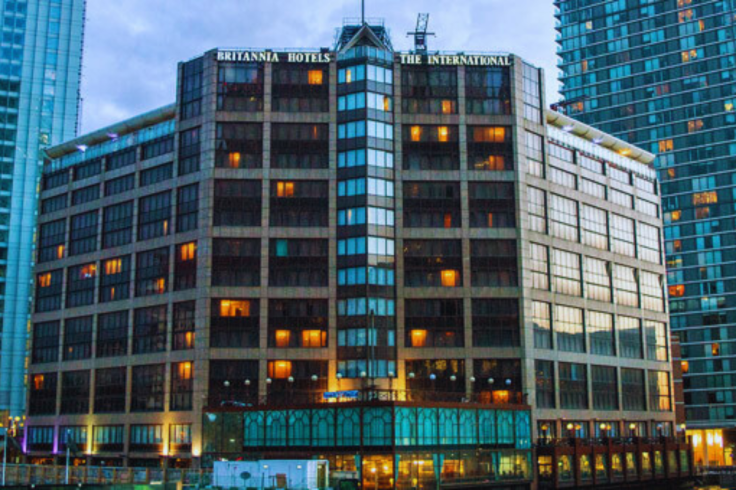Canary Wharf Protests Put Spotlight on New 28-Day Limit for Asylum Housing Support
The government cut the time refugees can stay in asylum accommodation from 56 to 28 days, which charities warn risks homelessness

The recent protests in Canary Wharf have reignited debate over the UK's asylum housing system. At the centre of the dispute is the government's decision to cut the time newly recognised refugees can remain in asylum accommodation from 56 days to just 28 days.
Demonstrations outside hotels being used to house asylum seekers have drawn attention to the pressure between government policy, community concerns and the welfare of people seeking protection. The protests have also raised questions about whether the government's approach can balance efficiency with fairness.
Protests at Canary Wharf
In July, demonstrators gathered outside the four-star Britannia International Hotel in Canary Wharf after it was identified for use as asylum accommodation, according to LBC. Protesters attempted to block access, lit flares and clashed with police, who issued dispersal orders and used powers to compel the removal of face coverings. At least one officer was struck during the unrest, according to The Times.
Organisers claimed the hotel's conversion into asylum accommodation would strain local services and argued that residents had not been properly consulted. Several arrests were made as confrontations escalated. Similar demonstrations have been reported across the UK, often marked by nationalist symbols such as Union Jacks and St George's Cross flags.
The 28-Day Rule Explained
The protests have been fuelled by a wider policy shift. Earlier this year, the Home Office reduced the period that newly recognised refugees can stay in asylum accommodation from 56 days to 28.
Ministers argue the change will reduce reliance on hotels and accelerate integration into communities. However, refugee organisations including the British Red Cross and Naccom say the timeframe is unworkable. They warn that four weeks is insufficient to apply for Universal Credit, secure housing or find employment, particularly in the context of high rents and stretched local authority budgets, according to The Guardian.
Campaigners also argue that reducing the so-called 'move-on period' risks pushing people into homelessness and destitution. They stress that the policy affects more than just administrative procedures, as it shapes whether refugees can build stable and safe lives in the UK.
Masked anti-asylum protesters, some dragging children along, stormed Canary Wharf shopping centre.
— The Baraka Show (@TheBarakaShow) September 1, 2025
Tensions flared, a police officer was punched in the face, and four arrests followed.
The Met warns it ‘won’t tolerate’ violence, but Britain’s immigration debate is spiralling… pic.twitter.com/3lpKCJyU0T
They shouldn’t have masks, this is wrong and intimidating. We’ve had enough but that attitude and behaviour won’t help
— Monica Clare (@MonicaClare1) August 31, 2025
This is what happens when you get 14 years of Tory government, the breakdown in the social fabric of the country. Interestingly these idiots are blaming Starmer for this.
— Colonel Panick (@FlackJimmmy) August 31, 2025
National Context
The scenes in Canary Wharf reflect a larger national challenge. As of March 2025, around 32,000 asylum seekers were being housed in fewer than 210 hotels across the UK, a reduction from nearly 400 in 2023, according to figures cited by Sky News. London remains the centre of the crisis, with more than 12,000 people in temporary accommodation.
Legal disputes over the policy are also increasing. A Court of Appeal ruling earlier this year allowed the continued use of the Bell Hotel in Epping for asylum housing. Since then, more than a dozen councils have launched challenges against the Home Office, arguing that they were not properly consulted and that costs have been shifted onto local communities without adequate support, AP News reported.
A Divisive Debate
The 28-day rule has sharpened tensions between government targets, public opinion and the needs of vulnerable families. Supporters see it as an overdue attempt to reduce hotel dependence and bring costs under control. Critics, however, argue that it reflects a hardening stance on asylum that fails to safeguard basic welfare.
In Canary Wharf, the protests highlight how a local dispute has become a symbol of a national policy struggle. Whether the new rule succeeds in easing pressure on the system or simply deepens division remains uncertain. What is clear is that the government now faces mounting pressure to demonstrate that efficiency can coexist with compassion in one of the country's most sensitive policy areas.
© Copyright IBTimes 2025. All rights reserved.





















